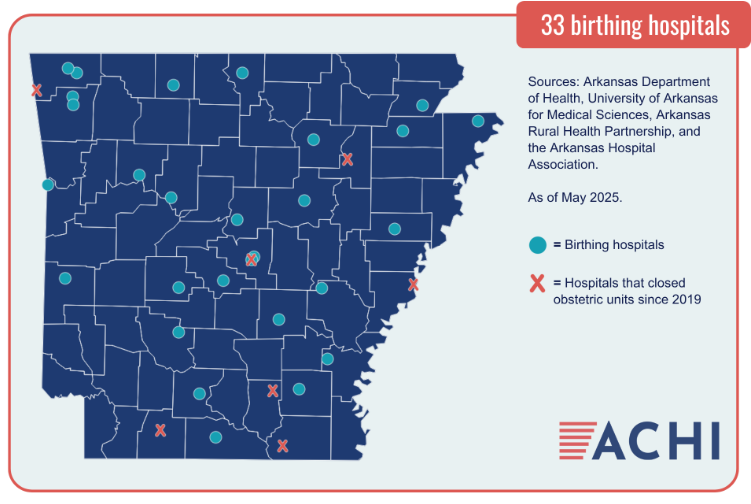
Maternity health care access has dropped to a critical level in several counties throughout Northwest Arkansas and the River Valley, as reported by a study from the maternal care-oriented nonprofit March of Dimes.
Arkansas officials are cautioning that upcoming reductions in Medicaid funding might exacerbate this problem.
Subscribe to Our NewslettersA 2024 study conducted by March of Dimes revealed that over 2 million women of childbearing age in the United States reside in regions known as 'maternity care deserts,' which are areas lacking hospitals that provide obstetric and labor and delivery services.
At home, Arkansas is one of the states with the largest proportion of areas lacking maternity care, as over 45% of the state's counties meet this criteria.
In the Northwest Arkansas and River Valley region, this encompasses Madison, Logan, and Scott counties.
As reported by the Arkansas Center for Health Improvement, there are currently 33 hospitals across the state that offer labor and delivery services. From 2019 onward, seven hospitals have ceased these services because of financial challenges or staff shortages.
Arkansas still deals with significant issues regarding maternity care," said Jennifer Wessel, the acting director of the Arkansas Center for Health Improvement. "In particular, rural regions might not have as many births, yet they are still required to maintain their labor and delivery services, meaning hospitals can't balance the expenses elsewhere. Usually, these labor and delivery departments are the first to shut down.
She mentioned that women living in areas without local birthing hospitals often need to travel much greater distances for prenatal and delivery services, which can raise the chances of health issues for both the mother and the child.
Medicaid reductions may be coming as part of President Donald Trump's One Big Beautiful Bill Act, which was approved this summer, with Arkansas legislators warning that it could jeopardize rural healthcare.
40/29 Lawmakers from both political parties were consulted by News regarding these reductions. Although they have differing views on the present utilization of Medicaid funds, they concur that the future will be challenging if these funds are eliminated.
If these mothers don't have Medicaid coverage, the providers won't be able to sustain their businesses," stated Arkansas State Representative and House Minority Leader Andrew Collins. "In many areas, you've witnessed the closing of rural hospitals or healthcare providers.

"We must begin again as a state, examining every dollar that is spent, understanding that we need the adaptability to address any needs or challenges that might arise due to federal budget reductions," said Arkansas State Senator Bryan King.
He claimed that reductions in Medicaid are unavoidable because of "governmental dysfunction," but Collins argues that Medicaid misuse is a small problem.
I believe we need to reverse many of the actions taken in this Big Beautiful Bill," Collins stated. "There is some agreement across party lines regarding the importance of increased subsidies. If these are extended, you won't witness significant rises in premiums.
The federal government remains closed as Democratic legislators demand adjustments to healthcare financing. Republicans argue that these discussions can take place once the government is back in operation.
TOP STORIES FROM KHBS:
Limited edition Stanley mugs are selling quickly, but these are still available
READ THE FULL STORY:Reduced availability of maternity health care in Arkansas might be made worse by reductions in Medicaid funding.
CHECK OUT KHBS:Latest updates on news and weather in Northwest Arkansas and the River Valley. Offering live, local, and up-to-the-minute reporting, along with the most recent weather information, KHBS/KHOG delivers more of what you're looking for.